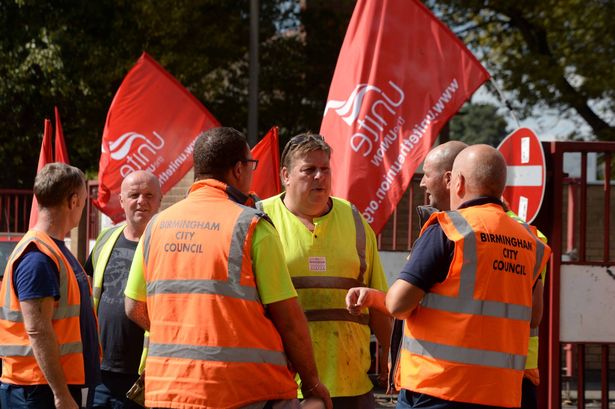A bitter struggle is back on the cards after Birmingham City Council shockingly announced, on 31st August, that it is to backtrack on previous assurances that over 120 refuse workers would not be made redundant. This surprise turnaround by the City Council comes after two months of industrial action by the refuse workers.
A bitter struggle is back on the cards after Birmingham City Council shockingly announced, on 31st August, that it is to backtrack on previous assurances that over 120 refuse workers would not be made redundant. This surprise turnaround by the City Council comes after two months of industrial action by the refuse workers.
Strike action has been ongoing since May, when Unite the Union members began their fight against the loss of 120 jobs, set to take place as part of the Council’s plan to eradicate Grade 3 staff posts. The affected workers were being offered (at best) lower paid jobs. In most cases this would have meant a £5,000 cut in annual pay.
These attacks form part of the City Council’s attempt to cut spending by £120 million, in addition to austerity cuts of over £600 million made since 2010. Birmingham’s waste management budget, for example, has already been cut from £71 million to £65 million since 2011.
The strike officially started on 30th June with two one-hour stoppages taking place. An overtime ban was implemented and all workers took as many lunch and tea breaks as possible. These initial actions were a warning shot, and throughout July and August the action was ramped up to try and get the council to reconsider.
By 16th August, the organised refuse workers had flexed their muscles, and the Council was forced to come back to the negotiation table. The City Council agreed that wages for all staff would be maintained; that the Grade 3 jobs would be secured in principle; and that they hoped to come to an agreement over an alteration to working hours, moving from a condensed 4-day week, to a shorter-hours 5-day week. Unions representatives were left satisfied and the strike was suspended.
It appeared, therefore, that the union had won an important victory. However, on 24th August, when the council was going to begin voting on the agreement, a public report was published condemning the agreement reached and imploring the Council to resume the scrapping of the Grade 3 posts. If these cuts were not made, it was stated, budget targets would not be met.
So on 31st August, the Council then issued redundancy letters to all Grade 3 staff and scrapped a planned meeting with union reps, originally scheduled for 1st September. Unite members immediately returned to the picket line, vowing to continue the strike to the end of the year if necessary.
These events are made all the more shocking by the fact that workers were sent redundancy letters from a Labour council – and for jobs that barely a fortnight earlier had been guaranteed.
From these betrayals, we must draw an important lesson: workers in struggle must not trust the bosses, bureaucrats or careerists. If the fight against cuts is to succeed, workers must rely on their own power.
For now, Unite members must seek to broaden their struggle as much as they can: first to the smaller refuse unions; then to other public sector workers; and finally to within the Labour Party itself – to demand a fighting lead against Tory austerity. Already, a number of Labour councillors – under pressure from below – have condemned the Council leadership’s decision.
With a militant lead from the tops of the trade unions and from Labour councillors, and with a united struggle from below, the labour movement has the power to stop these cuts and put a halt to the Tories’ austerity programme.
- Solidarity with the Birmingham refuse workers!
- No to Tory austerity!
- Trade unions and Labour councils must fight the cuts!






